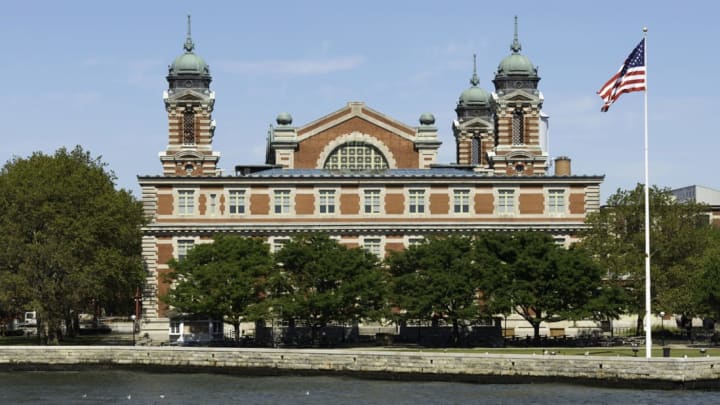When my great-grandfather Yuroslav Hieronymous O’Kagan vaan de Schulevitzberg arrived at Ellis Island in 1909 he didn’t speak much English. He was 17 and hoping to make his fortune quickly and bring the rest of his family over from the old country. He knew he would be asked a number of questions at arrival about his occupation, his health status, his living arrangements, etc., and he was prepared. As he approached the immigration officer, the first American he had ever met, the answers tumbled out in a nervous jumble, “Work factory! No coff-coff! Tooths very good! Go to Chicago! Buy house! Big house!”
The officer shook his head, laughed, and asked, “Name?”
Thinking the officer was mocking his presumptuous housing plan, he replied, “OK. OK … rent.” And that’s how we became the Okrent family.
This story is not true. Most stories of this kind are not true. Because, as Philip Sutton of the New York Public Library explains, the inspectors at Ellis Island “did not create records of immigration; rather they checked the names of the people moving through Ellis Island against those recorded in the ship’s passenger list, or manifest.” No names were changed at Ellis Island, because no names were taken at Ellis Island.
It is also highly unlikely that such comically inept communication would have ever taken place at Ellis Island. According to this article at U.S. Citizenship and Immigration Services, the Ellis Island immigrant inspectors all “spoke an average of three languages. They were assigned to inspect immigrant groups based on the languages they spoke. If the inspector could not communicate, Ellis Island employed a full-time army of interpreters and would call in temporary interpreters under contract to translate for immigrants speaking the most obscure tongues.”
So how did Jensen become Johnson, Koenigsberger become Kingsley, Mlodzianowski become Murphy, and so on? In some cases, names were entered incorrectly on the passenger list when travelers bought their tickets abroad. For example, a Portuguese named Teixeira, leaving from a French port, might have been entered as Techera. These types of mistakes were in fact sometimes corrected by Ellis Island inspectors (by lightly marking corrections, at the request of the passenger, above the name written in the manifest).
In other cases, immigrants were given alternate names by neighbors, bosses, co-workers, or teachers who couldn’t pronounce the originals. Those alternate names were then adopted by the immigrants when they submitted their applications for naturalization. Though the idea for the new name might have come from someone else, the name did not become official unless the immigrant chose to make it official when becoming a citizen.
The name you used when you applied for your naturalization papers did not have to match the manifest at Ellis Island. Names were adjusted, sometimes slightly, in order to fit new surroundings, and sometimes drastically, in order to fit new identities. My name, which was Okręt in the old country, was changed to Okrent to get as close as possible to the intended pronunciation (the ę is a nasalized e in Polish). Official name changes did not come about through haphazard errors, but because immigrants deliberately chose them. Chalk it up to the urge to assimilate, the drive for self-reinvention, or the excitement of using a freedom they hadn’t had before, but don’t blame it on the hardworking, multilingual clerks at Ellis Island.
